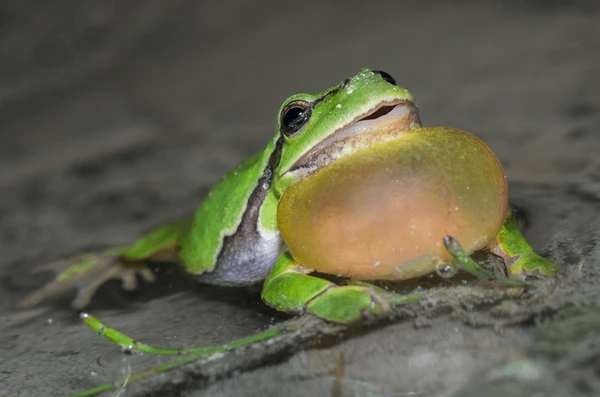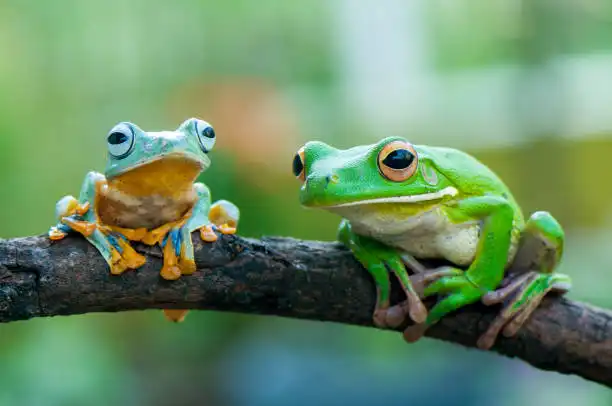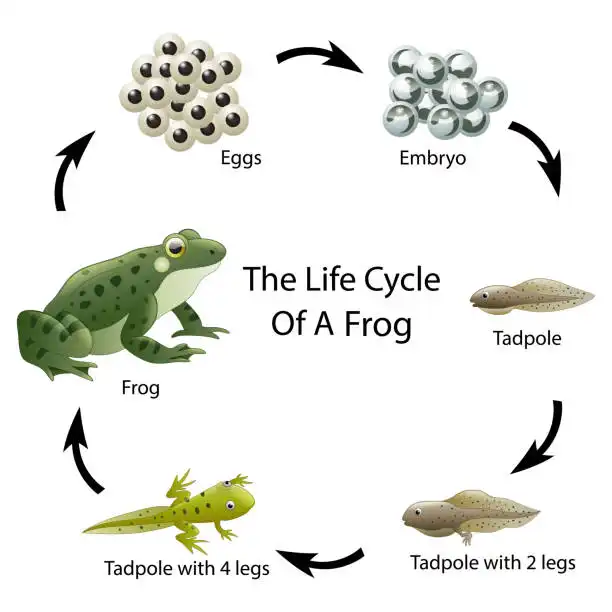Frogs are some of the most fascinating creatures you’ll find in nature. One of the first things you’ll notice about them is their distinctive croaking sound. But have you ever wondered why frogs croak and why it sometimes seems like they all start and stop croaking at the same time? Let’s hop into this curious world and uncover the reasons behind their noisy calls.

What is Croaking?
Frog croaking is the sound that frogs make by forcing air through their voice box, causing it to vibrate. This sound is amplified by the frog’s vocal sac, a balloon-like structure near its throat. When a frog croaks, you might notice its throat inflating, which is the vocal sac helping to project the sound far and wide.

Why Do Frogs Croak?
Frogs croak for a variety of reasons, but the most common reason is communication, especially during mating season. Let’s explore some of the key reasons behind this croaking behaviour:
1. Attracting Mates
One of the primary reasons frogs croak is to attract a mate. During breeding season, male frogs call out to female frogs in hopes of finding a partner. Each species of frog has its own unique croak, which helps females of the same species to identify them. The louder and more frequent the croak, the more attractive a male frog seems to a female.

The croaking is especially intense after rainfall when breeding conditions are ideal. The moisture provided by rain creates perfect spots for laying eggs, which hatch into tadpoles. A male frog’s croak is his way of saying, “I’m here and ready to find a mate!”

2. Marking Territory
Frogs are quite territorial when it comes to mating grounds. Male frogs use their croaks to mark and defend their territory from other males. It’s their way of saying, “This spot is mine!” Croaking not only warns off rival males but also ensures that the croaker is seen as dominant, which increases his chances of attracting a female.

3. Communicating with Each Other
Frogs also croak to communicate with other frogs in their surroundings. Some frogs call out to alert others of potential dangers, like a nearby predator. This warning system helps frogs stay safe in the wild. Other times, frogs croak in groups as a way of checking in with each other and confirming that they are in a safe, friendly environment.

4. Responding to Changes in Weather
Have you ever noticed how frogs often croak just before it rains? Frogs are sensitive to changes in humidity and atmospheric pressure, and their croaking can sometimes signal that rain is on the way. Since frogs thrive in moist environments, rain is a great thing for them, and their croaking can be seen as an excited response to this.

5. Synchronised Croaking
If you’ve heard a pond full of frogs, you might have noticed that they often seem to croak in sync, all starting and stopping at the same time. This synchronisation happens for a few reasons:

- Energy Conservation: Croaking uses up energy, and by taking breaks together, the frogs can save energy for when they really need to be loud.
- Avoiding Detection: Predators that hunt frogs might rely on sound to locate their prey. By croaking together, the frogs make it harder for a predator to pick out individual frogs.
- Timing During Mating Season: During breeding, male frogs may also synchronise their croaks to attract females more effectively. The sound of multiple males croaking at once creates a louder, more noticeable chorus that can draw in females from far away.
How Do Frogs Croak?
Now that we know why frogs croak, let’s take a look at how they produce these sounds. The process is quite fascinating:
- Air Movement: Frogs don’t use their lungs to make sounds the same way humans do. Instead, they use their mouth and nostrils to push air into their vocal cords.

- Vocal Sacs: Male frogs have vocal sacs that blow up like balloons when they croak. These sacs help to make the croak louder and carry further. When the frog inflates these sacs, the sound gets amplified, and other frogs can hear it from long distances.

- Sound Vibration: The frog’s larynx, or voice box, has vocal cords that vibrate when the air passes through. The vibration of these cords produces the sound of the croak.

Different frogs croak in different ways. Some have deep, loud calls, while others might produce high-pitched trills. The variety in their croaking is a bit like how each person has a unique voice.
Why Do Frogs Stop Croaking at the Same Time?
One of the most puzzling things about frogs is how they can suddenly stop croaking all at once. You might be enjoying the sound of frogs near a pond, and suddenly, silence falls. Why does this happen?
One explanation is that frogs stop croaking when they sense danger. Frogs have very sensitive hearing and can detect the slightest change in their environment. If they sense a predator, like a bird or snake, nearby, they’ll stop croaking to avoid giving away their position.

Another reason might be linked to their need to rest. Since croaking requires energy, frogs take breaks in between their calls to conserve their strength. These quiet moments allow them to regain energy for the next round of croaking.
Fun Facts About Frogs and Their Croaking
- Not all frogs croak: Some frogs chirp, whistle, or even bark! Each frog species has a unique call.
- Frogs have ‘ears’: Frogs have external eardrums called tympanums, located just behind their eyes. This helps them detect and respond to sounds, including the croaks of other frogs.
- Different species, different sounds: Some frogs, like the American Bullfrog, produce deep, loud croaks, while others, like tree frogs, make quieter, high-pitched calls.
Conclusion
Frog croaking is much more than just a noise. It’s a fascinating form of communication that helps frogs survive, find mates, defend territory, and warn each other of danger. Next time you hear frogs croaking near a pond, you’ll know that there’s a lot more happening than just a noisy chorus!
Frogs are truly remarkable creatures, and their croaks are an essential part of their lives. Whether they’re calling for a mate or signalling rain, the sound of frogs croaking is a reminder of how connected they are to the natural world.
For more interesting articles, please visit www.kidzherald.com




